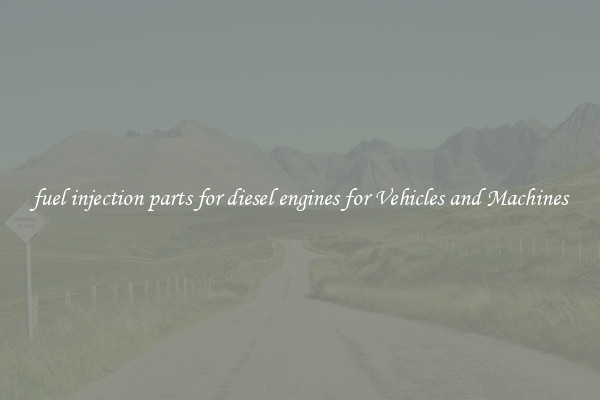fuel injection parts for diesel engines for Vehicles and Machines
Fuel injection is a crucial component of any diesel engine, whether it is used in vehicles or heavy machinery. It plays a significant role in the combustion process, ensuring that the engine receives the right amount of fuel for optimal performance and efficiency. Understanding the various fuel injection parts and their functions is essential for vehicle and machine owners to keep their engines running smoothly.

The fuel injection system consists of several parts that work together to supply the engine with fuel. The most crucial element is the fuel injector, which is responsible for precisely delivering fuel into the engine's combustion chamber. The injector is designed to atomize fuel and spray it in a fine mist, allowing for better mixing with air before ignition. This ensures efficient combustion and reduces emissions.
Another essential component is the fuel pump, which draws fuel from the tank and delivers it to the injectors under high pressure. Fuel pumps in modern diesel engines are often electronically controlled to provide accurate fuel delivery based on engine demand. This enables precise control over fuel injection timing, ensuring optimal efficiency and power output.
Fuel injectors and pumps are typically equipped with various sensors, such as pressure sensors, temperature sensors, and flow sensors. These sensors provide real-time data to the engine control unit (ECU), allowing it to calculate the appropriate fuel injection quantity and timing based on engine load, speed, and operating conditions. This advanced level of control ensures that the engine performs at its best across a wide range of operating conditions.
Fuel filters are also vital in the fuel injection system. They prevent contaminants, such as dirt, rust, and water, from entering the injectors, which can cause damage and affect their performance. Regularly replacing fuel filters is crucial to maintaining the longevity and efficiency of the fuel injection system.
In addition to these primary components, there are other auxiliary parts that play a supporting role in the fuel injection process. These include fuel lines, connectors, seals, and O-rings. Each of these parts must be in good condition and properly maintained to prevent fuel leaks or fuel line blockages, which can lead to engine malfunctions or failures.
In conclusion, fuel injection parts are integral to the performance and efficiency of diesel engines in vehicles and machines. From fuel injectors to pumps, sensors, filters, and auxiliary components, each part plays a critical role in providing the engine with the right amount of fuel at the right time. Proper maintenance and regular replacement of these parts are essential to ensure the longevity and optimal performance of the fuel injection system. By understanding the importance of these components, vehicle and machine owners can ensure that their engines continue to run smoothly and efficiently.

View details

View details

View details

View details








